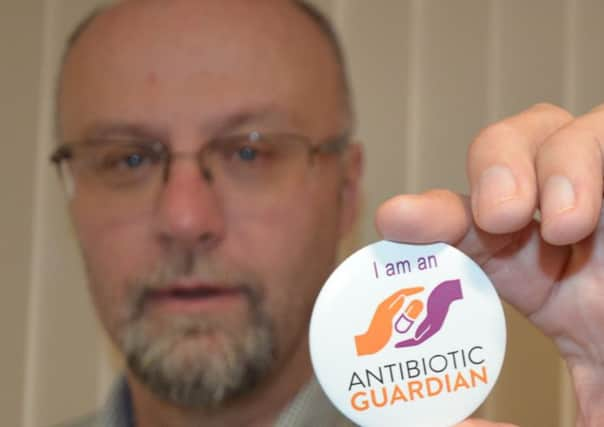My View, Dr David Crichton: Doctor urges more antibiotic awareness


It could become a fact if we don’t start to handle antibiotics with care and stop using them inappropriately.
Today (November 14) marks the launch of World Antibiotic Awareness Week, which is aiming to alert people to the growing threat of nasty bugs becoming resistant to antibiotics.
Advertisement
Hide AdAdvertisement
Hide AdAntibiotic resistance happens when bacteria change and become resistant to the antibiotics that are used to treat the infections they cause. It occurs naturally, but overuse of antibiotics in humans and animals is accelerating the process.
A growing number of infections such as pneumonia, tuberculosis and gonorrhoea, are becoming harder to treat as the common antibiotics used on them become less effective.
Not every infection requires an antibiotic and your GP will not prescribe them unless they are a medically appropriate treatment.
Antibiotics do not work on viral infections like common colds and flu. These illnesses will usually disappear within a week or so with the help of paracetamol, cold and flu remedies, decongestants and plenty of rest.
Advertisement
Hide AdAdvertisement
Hide AdYou should only take antibiotics when they are really needed for suspected bacterial infections. They need using sensibly so they can do their job of fighting infections effectively.
Bacteria are very cunning; they can find ways to survive the effects of an antibiotic and become resistant, which is one of the most significant threats to modern medicine. Setting broken bones, basic operations, even chemotherapy, all rely on access to antibiotics.
Antibiotics are precious because they take a long time to come into use. While there are some new ones in development, none are expected to be effective against the most dangerous forms of antibiotic-resistant bacteria
So Doncaster GPs like me are joining medical colleagues from around the world in warning that widespread use of antibiotics could soon make them useless against fighting life-threatening infections unless action is taken now. You may see us wearing badges like this one my colleague Dr Jeremy Bradley, from Hatfield, is holding, right.
Advertisement
Hide AdAdvertisement
Hide AdIt’s not scaremongering. England’s Chief Medical Officer has called the problem a “ticking time bomb”, with antibiotic resistance being a global problem. It’s feared that by 2050, drug-resistant infections could kill an extra 10 million people a year across the world if the current over-prescribing trend continues. Visit Antibiotic Guardian for more information.